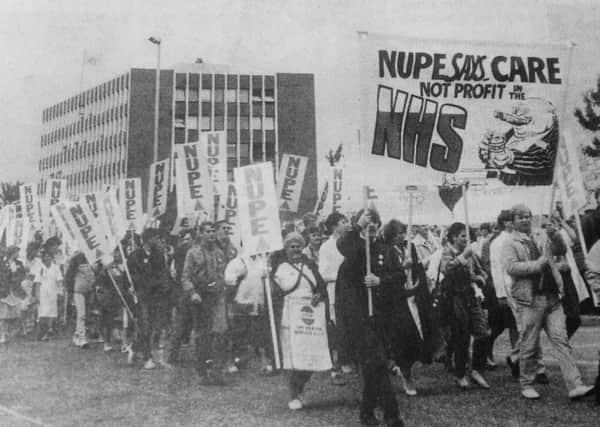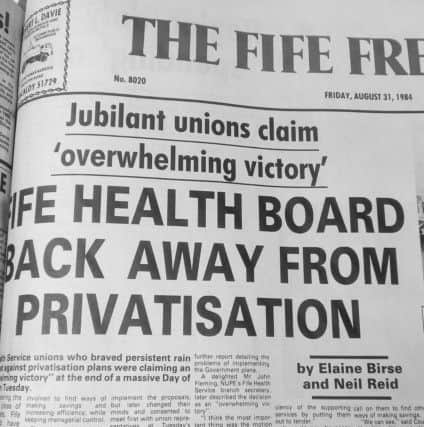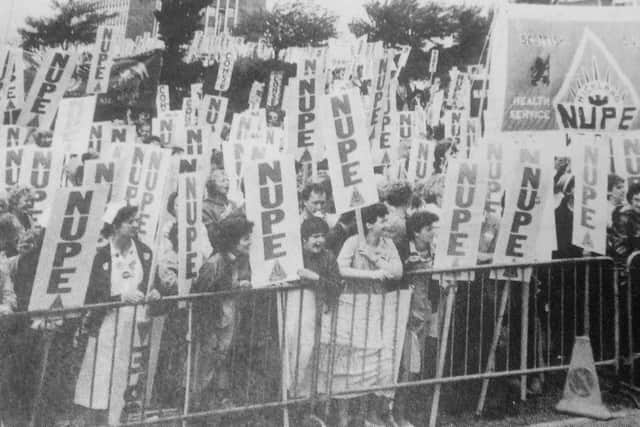How Fife health staff fought against privatisation plans in 1984


Back then NHS Fife was Fife Health Board – which itself went through some turmoil with a succession of general managers – and 1984 saw it lock horns with the trade unions, Fife Council and the Scottish Office.
At the heart of row of the row was the ’P’ word – privatisation. Unthinkable to staff, and the solution to balancing budgets and delivering greater efficiency according to senior managers
Advertisement
Hide AdAdvertisement
Hide AdAugust saw an unholy row kick-off over plans for Fife to become the first health board in Scotland to implement the Government’s privatisation proposals.


Managers wanted to tender for catering and cleaning services in the wards, and the headquarters in Glenrothes, sparking a huge backlash with unions.
As they gathered for their monthly meeting, they faced the prospect of a huge demonstration.
The heavyweights of the day in the union world were all summoned, Mick McGahey of the NUM, Rodney Bickerstaff from NUPE, and Martin O’Neill MP, Labour’s spokesman on health.
Advertisement
Hide AdAdvertisement
Hide AdReports said an estimated 10,000 were ready to march on the Glenrothes HQ and then stage a rally at Warout Stadium.


You may also be interested in:
In the end 2000 turned up, but, more importantly, they won.
The Government directive was binned, and talks began with unions to come up with alternative plans to make savings.
The board’s climbdown delighted campaigners but incurred the wrath of Scottish health Minister John Mackay.
He was far from impressed no-one told him before news reached the media, and, in a pointed statement, said: “If they have taken that decision and that has been reached under pressure from the health service unions, I can only say I strongly deprecate that decision.”
Advertisement
Hide AdAdvertisement
Hide AdCoincidentally he was due in Fife the following month to visit the newly-opened Whyteman’s Brae hospital wing in Kirkcaldy, so, item one on the agenda, was some plain speaking on the directive.
He said it was “an instruction rather than an order”, but was clearly not a happy man.
The tone of talks with trade unions was described as “reasonable” – as withering as it gets in these official statements.
Mr MacKay said: “The Minister has powers to issue directives. I have not done so in the case and I am not considering doing so. I shall consider the whole question in light of what all boards decide. The picture will be a lot clearer by the end of the year.”
Advertisement
Hide AdAdvertisement
Hide AdBut while he sorted out one mess, another head-on collision between Fife Health Board and the Scottish Office emerged.
This time the Government issued a directive to put the first ever pay bed in the region, very much against the wishes of the board.
There had never been any private beds in Fife’s hospitals, but the seeds were sown in a push from senior medical staff in 1983 after they submitted an application for certain private facilities under NHS regulations.
And this directive, from George Younger, Secretary of State for Scotland, came with a statutory obligation to act.
The backlash was immediate.
Advertisement
Hide AdAdvertisement
Hide AdThe normal diplomatic language went out of the window as councillors and trades union leaders pitched in.
Unions threatened to isolate any patient using the single bed – regardless of where it was located.
James Milne, secretary general of the STUC, accused Mr Younger of taking a “disgraceful decision”, adding: “He seems to think he is in a better position to judge the health care needs of the people of Fife.
“This has been issued out of spite because of the board’s earlier decision not to privatise services.”
Advertisement
Hide AdAdvertisement
Hide AdChristine Hall, who single-handedly led the watchdog Fife Health Council and was a thorn in the flesh of many senior managers and ministers, said it was “sour grapes”.
But the strongest condemnation came from Councillor Henry McLeish, a future First Minister of Scotland. He spoke of “jackboot tactics” and a “cynical act of revenge” and called on FHB lawyers to challenge the directive.